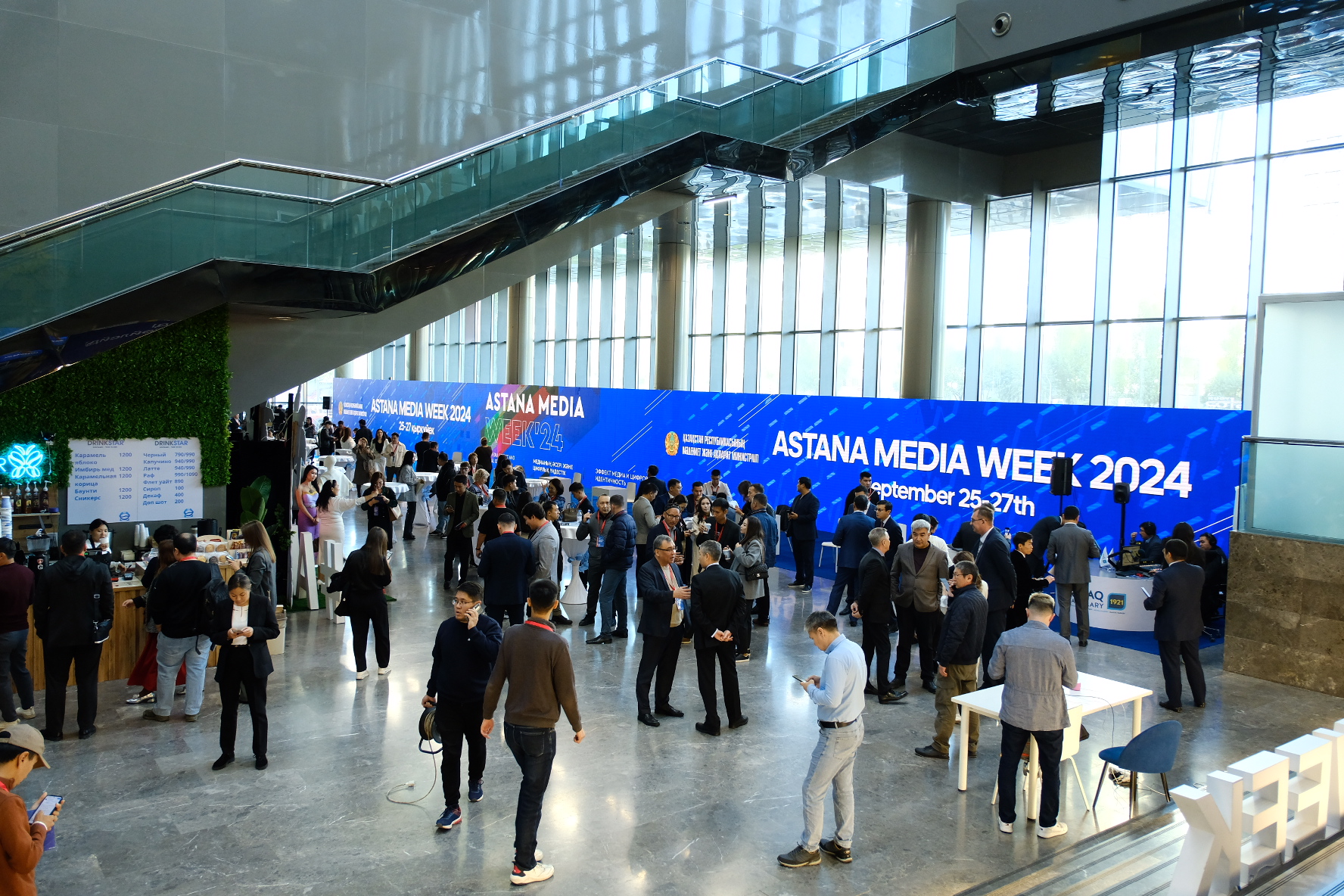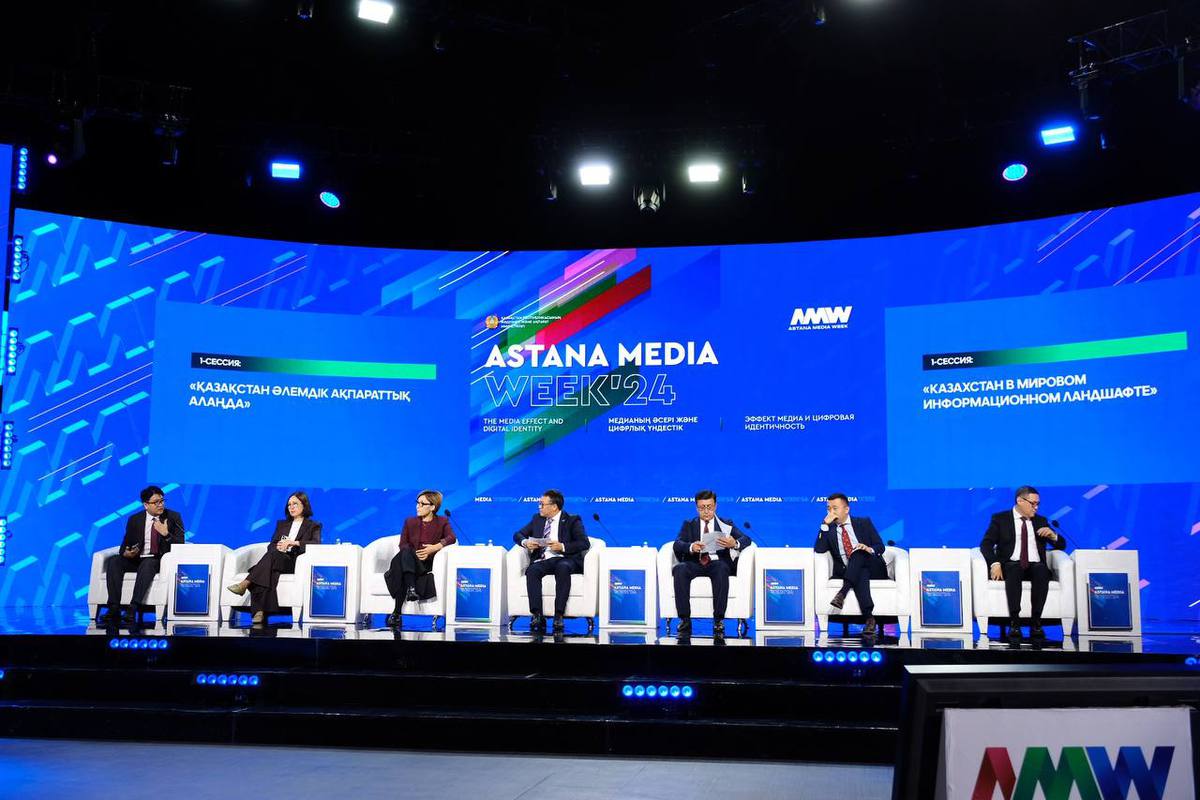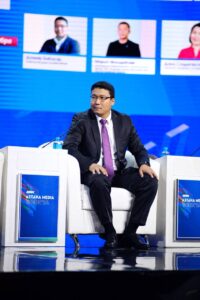ASTANA—Astana Media Week, an annual event in the field of media and journalism, brought together industry experts and international organizations for in-depth discussions on media transformation in the digital era. The three-day event, which kicked off on Sept. 25, provided participants a platform to engage in conversations about the changing dynamics of the media landscape in Kazakhstan and across the globe.

Astana Media Week 2024. Photo credit: Astana Media Week
The event featured panel discussions on Kazakhstan’s position in the global informational landscape, its prospects, media transformation, challenges, regulators, laws and initiatives on digital responsibility and media safety. The panelists addressed the changes in the media landscape, emphasizing the growing need for Kazakhstan to strengthen its presence on international platforms.
Kanat Iskakov, the Kazakh Vice Minister of Information and Public Development, noted that Kazakhstan should establish offices of international media corporations in the country to secure its presence on global media platforms and foster higher journalism standards.
“We have already crossed the threshold of the digital age, and now we must create and consolidate our national digital identity. This requires not only technological but also legal changes,” added Iskakov.
Challenges of digitalization, media responsibility, fact-checking
Discussions touched on the challenges of digitalization and the new ethical and legal demands it imposes. Yerkin Tukumov, the director of the Kazakhstan Institute for Strategic Studies (KazISS), discussed the societal impact of artificial intelligence (AI) and digital technologies on media, warning that the rapid pace of digitalization introduces complexities that media professionals and regulators must navigate.

Panel discussion on Kazakhstan’s position in the global informational landscape at Astana Media Week 2024. Photo credit: Astana Media Week
“The digitalization rate is high, but how much longer will we be able to cope with such rapid development? If earlier the concept of the media was clear—television, magazines, newspapers—now everyone with a smartphone can be part of it,” said Tukumov.
Senura Abeywardena, the head of public policy for Central Asia, Mongolia, Sri Lanka, and the Maldives at Meta, presented the company’s initiatives to counter the spread of misinformation and disinformation.
During his presentation, Abeywardena highlighted the Sept. 16 announcement about the partnership between Factcheck.kz, the first professional fact-checking resource in Central Asia, and Meta as part of the global fact-checking program.
“Misinformation can be unintentional, while disinformation is often shared with the intent to mislead. As a technology company, we have developed specific policies to handle both,” said Abeywardena, explaining how Meta aims to reduce the visibility of false content on Facebook, Instagram and Threads while investigating coordinated disinformation campaigns.
The speakers noted that this focus on digital responsibility aligns with a broader global concern about the ethical challenges that arise as media shifts from traditional to digital platforms blended with user-generated content.
AI for crisis management in mass media

Daniyar Bibasar, CEO of the iMAS (Information Monitoring and Analysis System) group. Photo credit: Astana Media Week
Astana Media Week also delves into big data analysis, AI in media, and the use of technology in managing social tension and crises.
Daniyar Bibasar, the CEO of the iMAS (Information Monitoring and Analysis System) group, emphasized the role of AI-driven tools in supporting media professionals during crises.
“This media week is centered around new trends, including artificial intelligence, networks and the challenges journalists and press secretaries face today. Our service helps by identifying key trends quickly—what is being written, where it is being discussed and the nature of the discourse around various issues,” said Bibasar.
Bibasar noted that the service is designed not only to monitor and analyze all information flows but also to profile social media users, identifying the source of illicit and harmful online content.
Building a future for global journalism
Several speakers, including Yerbolat Mukhamedzhan, a journalist and deputy chairman of the board of Maqsut Narikbayev University, emphasized the need for Kazakhstan to produce world-class journalists capable of navigating this rapidly evolving media landscape.

Yerbolat Mukhamedzhan, a journalist and deputy chairman of the Board of Kazakh University of Humanities and Law named after Maqsut Narikbayev. Photo credit: Astana Media Week
“For the past 30 years, we have talked about Kazakhstan’s position on the world stage, but it is not enough to simply say that we are ‘the voice’ in the global conversation. It is time for us to be pro-active and shape the global information agenda,” said Mukhamedzhan.
In addition to university-based training, Mukhamedzhan urged local media institutions to prepare professionals who can shape global narratives and address media challenges in the digital age.
“Universities must ensure that their programs align with international standards. At least 70%-80% of the curriculum must be designed to produce globally competitive journalists. We need to ensure that our students participate in international internships, gaining exposure to the global media industry,” he added.
This vision was shared by Assel Kozhakova, the official representative of Euronews in Kazakhstan, who announced plans for a new academy that will train Kazakh journalists, managers and technical specialists in various aspects of media development.
“Euronews will have a production office here in Astana, covering content about Kazakhstan and Central Asia. Approximately 80% of the staff will be Kazakh journalists and professionals,” said Kozhakova.


